Sadulaev Leads Group of Four Russians into Saturday's European Finals
Friday, February 14, 2020 - 18:10 By Eric Olanowski

ROME, Italy (February 13) --- The Russian Federation, led by Abdulrashid SADUALEV (RUS), posted a 13-1 record on the opening day of freestyle wrestling and inserted four of five wrestlers into Saturday night's European finals.
Sadulaev extended his European win streak to 21 consecutive matches after bringing an unblemished 17-0 record into Rome.
The four-time world champion and Rio Olympic gold medalist picked up top-ten wins over No. 4 Magomedgadji NUROV (MKD) and No. 6 Elizbar ODIKADZE (GEO), and also had his hand raised against Ibrahim BOLUKBASI (TUR) and Nurmagomed GADZHIYEV (AZE).
Sadulaev started his day with an 8-2 win over reigning world bronze medalist Nurov. Despite picking up the 8-2 win, he got lateral dropped for two points in the opening period and trailed 2-0.
Sadualev survived another scare in his second match when Bolukbasi locked up a cradle and nearly pinned him. He fought off his back and scored nine unanswered points, winning the match, 9-4.
In the quarterfinals, he defeated Nurmagomed Gadzhiev, 10-4, in a rematch of last year’s European Games finals.
In the semifinals, Sadulaev ousted sixth-ranked Odikaze, 6-0. He took Odikadze down three times in the first period and led 6-0 after the opening three minutes of the match. He moved into the European finals for the sixth time after a scoreless second period.
He’ll square off with Olympic bronze medalist Albert SARITOV (ROU) in the 97kg gold-medal match. Saritov slammed Gennadij CUDINOVIC (GER), 10-0, and will wrestle for European gold for the first time in his career.
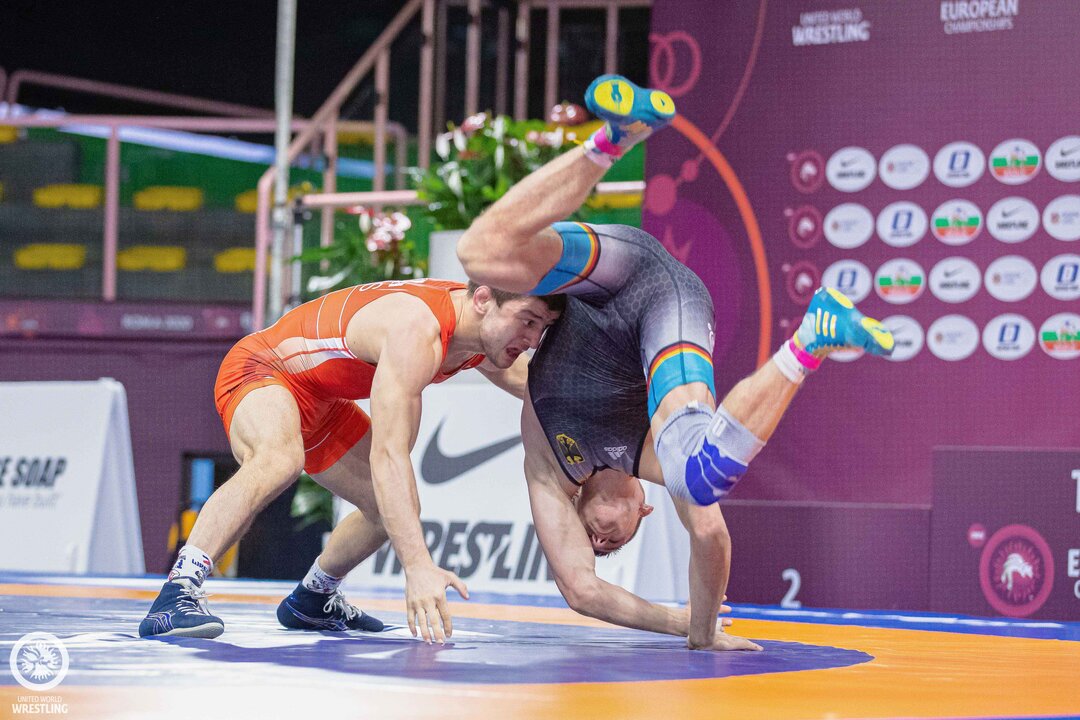 Azamat TUSKAEV (RUS) was one of four Russian wrestlers who reached the European finals with wins on Friday night (Photo: Kadir Caliskan)
Azamat TUSKAEV (RUS) was one of four Russian wrestlers who reached the European finals with wins on Friday night (Photo: Kadir Caliskan)
Azamat TUSKAEV (RUS), Kurban SHIRAEV (RUS) and Magomed RAMAZANOV (RUS) are the three other Russians who’ll join Sadualev in gold-medal matches on Saturday night.
Tuskaev defeated Horst LEHR (GER), 5-4, in the semifinals and will take on defending champion Suleyman ATLI (TUR) in the finals. The Russian led Lehr 4-0 in their semifinals match, and though he was outscored 4-1 in the final period, he hung on to win, 5-4.
Tuskaev’s final opponent, Atli, won three matches and is one win away from defending his European crown from last year. Atli defeated No. 3 Stevan MICIC (SRB), 7-5, in the opening round. He tossed Micic to his back with a massive four-point throw and scored a second consecutive win over the Serbian Olympian and “2020 History Maker of the Year” award winner. He also beat Micic in the semifinals at the 2019 World Championships.
In his second match, Atli cruised to a 7-1 win over two-time European medalist Andrei DUKOV (ROU), who knocked off ninth-ranked Givi DAVIDOVI (ITA), 4-4, in his opening-round match.
Atli wrestled Mihran JABURYAN (ARM) in the semifinals and reached the finals with a 6-3 win over the Armenian.
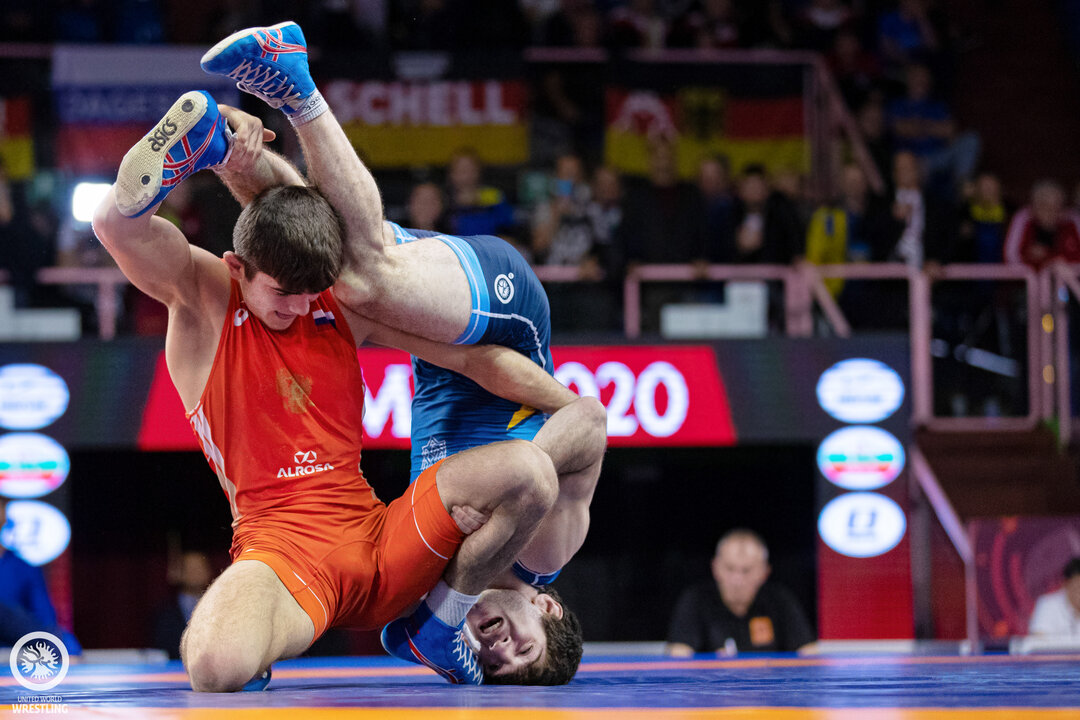 Kurban SHIRAEV (RUS) looks to finish on shot on Erik ARUSHANIAN (UKR) in the 65kg semifinals. (Photo: Kadir Caliskan)
Kurban SHIRAEV (RUS) looks to finish on shot on Erik ARUSHANIAN (UKR) in the 65kg semifinals. (Photo: Kadir Caliskan)
At 65kg, 20-year-old ring star Kurban Shiraev carried over his hot streak from the Ivan Yariguin and made it to the European finals in his senior-level continental debut.
Shiraev, who defeated Rio Olympic champion Soslan RAMONOV (RUS) in the Yariguin finals, tallied four takedowns and stepout against Erik ARUSHANIAN (UKR) and inserted himself into the finals with a 9-2 win.
He’ll compete against Niurgun SKRIABIN (BLR) in the 65kg gold-medal match.
Skriabin scorched fourth-ranked Iszmail MUSZUKAJEV (HUN), 10-0, in their quarterfinals meeting. Then, in the semifinals, Skriabin upended Ali RAHIMZADE (AZE), who was fresh off a 7-0 opening round thumping of Rio Olympic champion Vladimer KHINCHEGASHVILI (GEO).
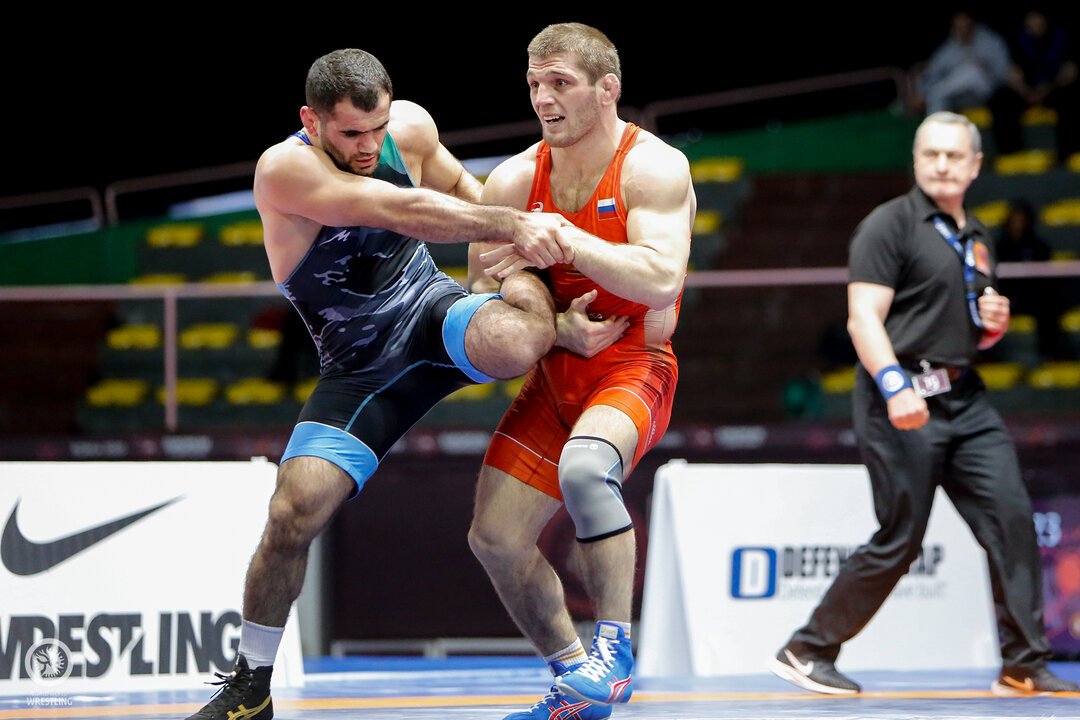 Magomed RAMAZANOV (RUS) finishes a shot on two-time world runner-up Jabrayil HASANOV (AZE) in the 79kg semifinals. (Photo: Gabor Martin)
Magomed RAMAZANOV (RUS) finishes a shot on two-time world runner-up Jabrayil HASANOV (AZE) in the 79kg semifinals. (Photo: Gabor Martin)
Magomed Ramazanov reached the 79kg European finals in his continental debut. He capped off his day with a win over reigning two-time world silver medalist Jabrayil HASANOV (AZE). Ramazanov stopped the Rio Olympic bronze medalist from reaching the European finals for the seventh time in his career with a 4-2 win.
Ramazanov and Mahamedkhabib KADZIMAHAMEDAU (BLR) will wrestle for the 79kg gold medal. Kadzimahamedau efficiently handled Dzhemal ALI (BUL), 10-1, in their semifinals meeting.
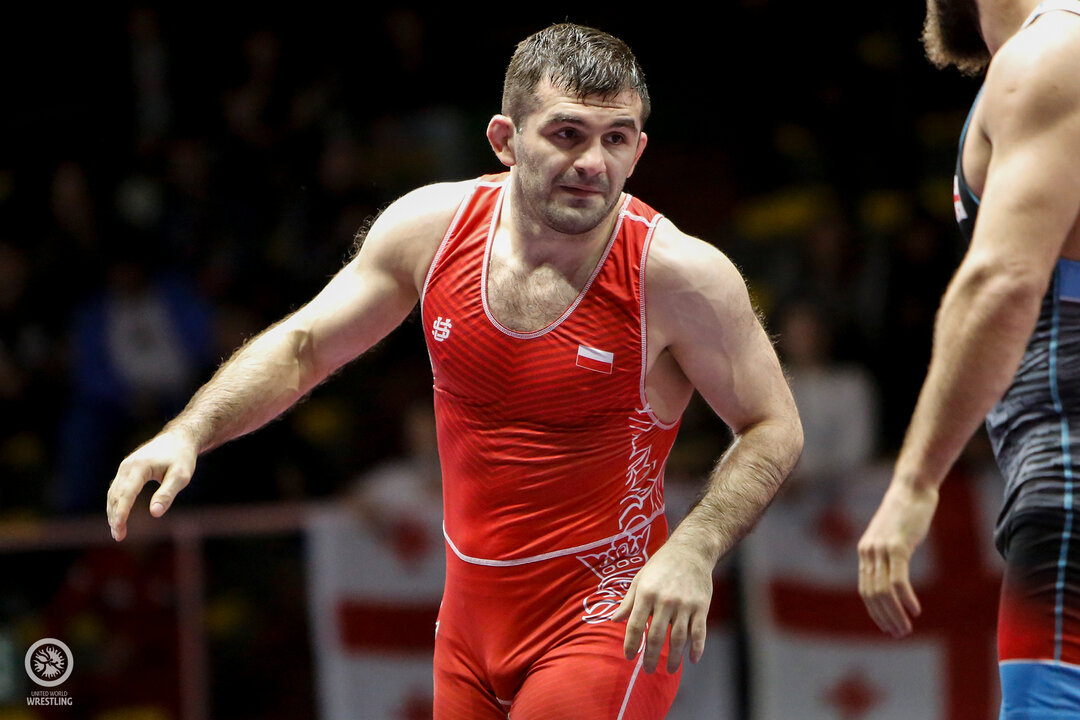
Magomedmurad GADZHIEV (POL) will wrestle in his fifth European finals. He'll take on Aghahuseyn MUSTAFAYEV (AZE) in the 70kg finals. (Photo: Gabor Martin)
Mustafayev and Gadzhiev to Wrestle for the 70kg Gold
The lone finals match on Saturday night that won’t feature a Russian wrestler will be the 70kg gold-medal match.
Aghahuseyn MUSTAFAYEV (AZE) moved pasted Mihail SAVA (MDA) and will meet fourth-ranked Magomedmurad GADZHIEV (POL) in the gold-medal match.
Mustafayev, a returning European finalist, outscored Fati VEJSELI (MKD) and Haydar YAVUZ (TUR), 12-0, and reached the semifinals. He picked up the 5-2 win over Sava and will look to improve on his runner-up finish from a year ago.
Gadzhiev, a reigning world bronze medalist, outscored Mirza SKHULUKHIA (GEO), 4-0, in the final 90 seconds of the pair's ultra-physical semifinals bout and claimed the 4-1 victory. He’ll wrestle in the European finals for the fifth time in his career. Gadzhiev is 1-4 in European finals and is hoping to reach the top of the podium for the first time since 2016.
Gadzhiev European Finals Appearances
2010 European Championships – Silver
2015 European Games – Silver
2016 European Championships – Gold
2017 European Championships – Silver
2018 European Championships – Silver
Saturday’s freestyle finals being at 18:00 (local time) and can be followed live on www.unitedworldwrestling.org.
RESULTS
57kg
GOLD - Azamat TUSKAEV (RUS) vs. Suleyman ATLI (TUR)
SEMIFINAL - Azamat TUSKAEV (RUS) df. Horst Justin Junior LEHR (GER), 5-4
SEMIFINAL - Suleyman ATLI (TUR) df. Mihran JABURYAN (ARM), 6-3
65kg
GOLD - Niurgun SKRIABIN (BLR) vs. Kurban SHIRAEV (RUS)
SEMIFINAL - Niurgun SKRIABIN (BLR) df. Ali RAHIMZADE (AZE), 5-1
SEMIFINAL - Kurban SHIRAEV (RUS) df. Erik ARUSHANIAN (UKR), 9-1
70kg
GOLD - Aghahuseyn MUSTAFAYEV (AZE) vs. Magomedmurad GADZHIEV (POL)
SEMIFINAL - Aghahuseyn MUSTAFAYEV (AZE) df. Mihail SAVA (MDA), 5-2
SEMIFINAL - Magomedmurad GADZHIEV (POL) df. Mirza SKHULUKHIA (GEO), 4-1
79kg
GOLD - Mahamedkhabib KADZIMAHAMEDAU (BLR) vs. Magomed RAMAZANOV (RUS)
SEMIFINAL - Mahamedkhabib KADZIMAHAMEDAU (BLR) df. Dzhemal Rushen ALI (BUL), 10-1
SEMIFINAL - Magomed RAMAZANOV (RUS) df. Jabrayil HASANOV (AZE), 4-2
97kg
GOLD - Albert SARITOV (ROU) vs. Abdulrashid SADULAEV (RUS)
SEMIFINAL - Albert SARITOV (ROU) df. Gennadij CUDINOVIC (GER), 10-0
SEMIFINAL - Abdulrashid SADULAEV (RUS) df. Elizbar ODIKADZE (GEO), 6-0

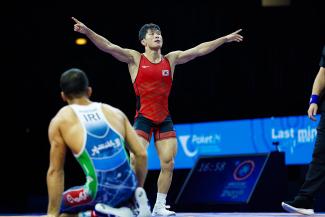
Share your thoughts.
Comments